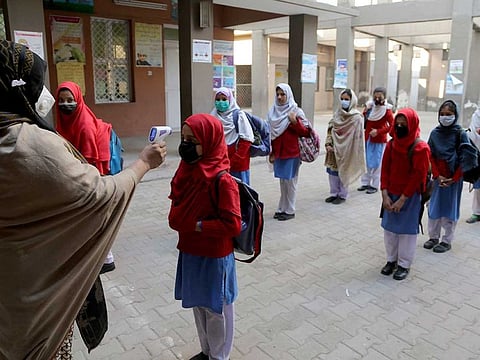Pakistan parliament approves compulsory Arabic classes in Islamabad schools
Bill suggests teaching basics of language till Grade 5 and grammar in the upper grades

Islamabad: Students in Islamabad schools will be required to study Arabic as a foreign language following the approval of a bill in Pakistan’s upper house of parliament.
Pakistan’s Senate has approved the Compulsory Teaching of the Arabic Language Bill 2020 which makes Arabic classes mandatory at all primary and secondary federal schools in the capital city of Islamabad. The bill suggests teaching the basics of the Arabic language in grades I to V and the Arabic language grammar in grades VI to XII.
Arabic, the official language of more than 25 countries, would open up new opportunities for Pakistanis in the Middle East, officials said. “Besides having religious importance for Muslims, Arabic is among the five widely spoken languages of the world,” reads the statement of objectives attached to the bill. “The knowledge of Arabic language will not only enlighten the understanding of Islam and the message of the Holy Quran, it will also broaden the employment and business opportunities for the citizens of Pakistan as well,” it added.
The bill was presented by Senator Javed Abbasi and approved by all members of the Senate, except Raza Rabbani from the opposition Pakistan People’s Party who gave a dissenting note, saying that such moves would impact Pakistan’s multicultural diversity.
What Pakistanis are saying?
The Senate’s decision drew a mixed reaction on social media. Some sided with the decision, while others termed it “an additional burden on children.”
“Arabic is the language of the Quran. Making it compulsory at school level will help us to improve the understanding of the Holy Quran in its true spirit” said Muhammad Shamrez. Many others who agreed with the decision cited similar reasons that it would bring people closer to their faith. Others said language learning would improve cross-cultural communication, and can enhance future job opportunities for the children. “Learning a language always gives you a competitive edge, so I would encourage my children to learn Arabic,” said Asma Zehra, mother of two and resident of Islamabad.
However, a large number of people who disagreed with the decision proposed that multiple foreign languages should be taught in schools as “an optional subject not compulsory.” Mustafa Wynne said that learning a new language such as Arabic could help improve career prospects but suggested that “policymakers should rather focus on science, technology, engineering and mathematics (STEM)” to prepare students for future jobs.
Sign up for the Daily Briefing
Get the latest news and updates straight to your inbox







